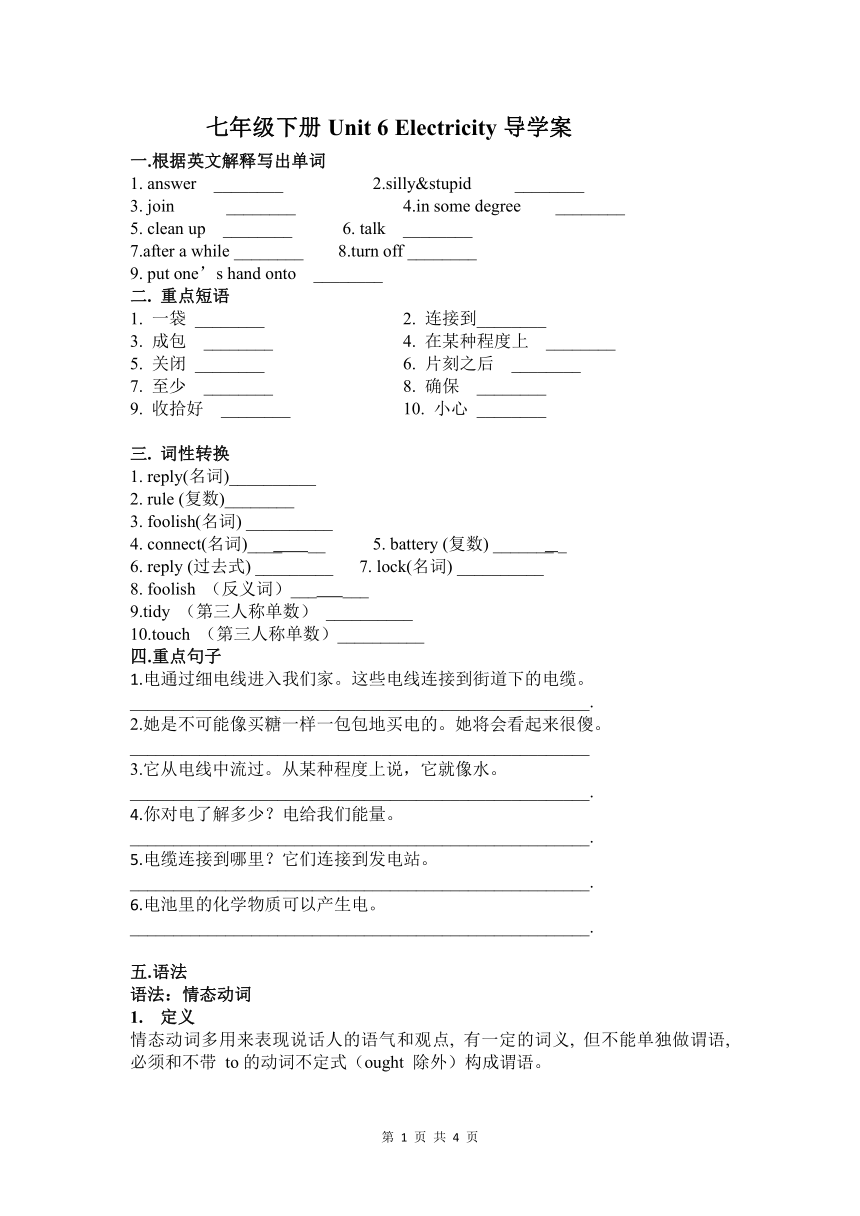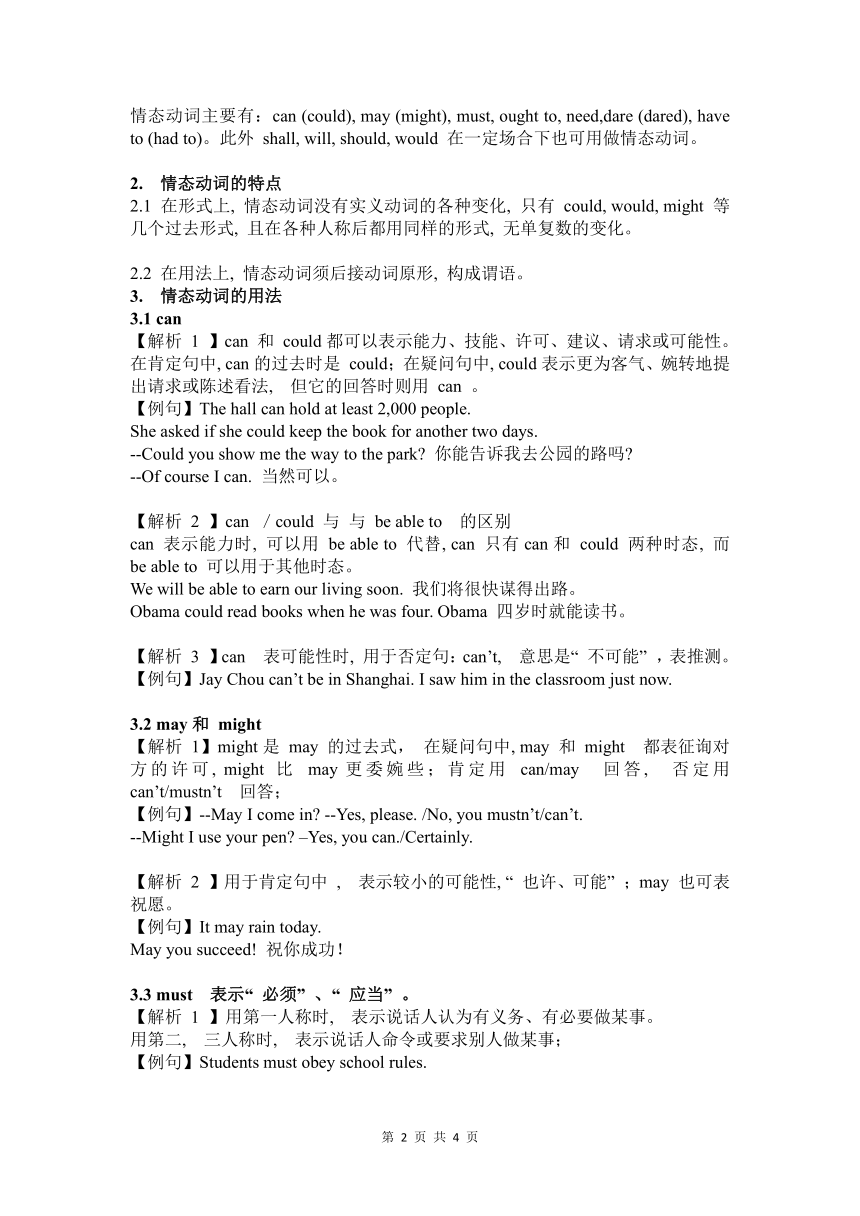牛津深圳版七下:Unit 6 单元导学案(无答案)
文档属性
| 名称 | 牛津深圳版七下:Unit 6 单元导学案(无答案) |  | |
| 格式 | docx | ||
| 文件大小 | 23.9KB | ||
| 资源类型 | 教案 | ||
| 版本资源 | 牛津深圳版 | ||
| 科目 | 英语 | ||
| 更新时间 | 2021-04-16 15:09:07 | ||
图片预览


文档简介
七年级下册Unit 6 Electricity导学案
一.根据英文解释写出单词
1. answer ________ 2.silly&stupid ________
3. join ________ 4.in some degree ________
5. clean up ________ 6. talk ________
7.after a while ________ 8.turn off ________
9. put one’s hand onto ________
二. 重点短语
1. 一袋 ________ 2. 连接到________
3. 成包 ________ 4. 在某种程度上 ________
5. 关闭 ________ 6. 片刻之后 ________
7. 至少 ________ 8. 确保 ________
9. 收拾好 ________ 10. 小心 ________
三. 词性转换
1. reply(名词)__________
2. rule (复数)________
3. foolish(名词) __________
4. connect(名词)____ __ 5. battery (复数) _______ _
6. reply (过去式) _________ 7. lock(名词) __________
8. foolish (反义词)___ ___
9.tidy (第三人称单数) __________
10.touch (第三人称单数)__________
四.重点句子
1.电通过细电线进入我们家。这些电线连接到街道下的电缆。
_____________________________________________________.
2.她是不可能像买糖一样一包包地买电的。她将会看起来很傻。
_____________________________________________________
3.它从电线中流过。从某种程度上说,它就像水。
_____________________________________________________.
4.你对电了解多少?电给我们能量。
_____________________________________________________.
5.电缆连接到哪里?它们连接到发电站。
_____________________________________________________.
6.电池里的化学物质可以产生电。
_____________________________________________________.
语法
语法:情态动词
1. 定义
情态动词多用来表现说话人的语气和观点, 有一定的词义, 但不能单独做谓语, 必须和不带 to的动词不定式(ought 除外)构成谓语。
情态动词主要有:can (could), may (might), must, ought to, need,dare (dared), have to (had to)。此外 shall, will, should, would 在一定场合下也可用做情态动词。
2. 情态动词的特点
2.1 在形式上, 情态动词没有实义动词的各种变化, 只有 could, would, might 等几个过去形式, 且在各种人称后都用同样的形式, 无单复数的变化。
2.2 在用法上, 情态动词须后接动词原形, 构成谓语。
3. 情态动词的用法
3.1 can
【解析 1 】can 和 could都可以表示能力、技能、许可、建议、请求或可能性。在肯定句中, can的过去时是 could;在疑问句中, could表示更为客气、婉转地提出请求或陈述看法, 但它的回答时则用 can 。
【例句】The hall can hold at least 2,000 people.
She asked if she could keep the book for another two days.
--Could you show me the way to the park? 你能告诉我去公园的路吗?
--Of course I can. 当然可以。
【解析 2 】can /could 与 与 be able to 的区别
can 表示能力时, 可以用 be able to 代替, can 只有can和 could 两种时态, 而 be able to 可以用于其他时态。
We will be able to earn our living soon. 我们将很快谋得出路。
Obama could read books when he was four. Obama 四岁时就能读书。
【解析 3 】can 表可能性时, 用于否定句:can’t, 意思是“ 不可能” ,表推测。
【例句】Jay Chou can’t be in Shanghai. I saw him in the classroom just now.
3.2 may和 might
【解析 1】might是 may 的过去式, 在疑问句中, may 和 might 都表征询对方的许可, might 比 may更委婉些;肯定用 can/may 回答, 否定用 can’t/mustn’t 回答;
【例句】--May I come in? --Yes, please. /No, you mustn’t/can’t.
--Might I use your pen? –Yes, you can./Certainly.
【解析 2 】用于肯定句中 , 表示较小的可能性, “ 也许、可能” ;may 也可表祝愿。
【例句】It may rain today.
May you succeed! 祝你成功!
3.3 must 表示“ 必须” 、“ 应当” 。
【解析 1 】用第一人称时, 表示说话人认为有义务、有必要做某事。
用第二, 三人称时, 表示说话人命令或要求别人做某事;
【例句】Students must obey school rules.
【解析 2 】在疑问句中, 表示询问对方的意图。肯定回答用 must, 否定回答用needn’t/don’t have to“ 没必要, 不必” ;而不是用 mustn’t, mustn’t 表示“ 不应该” 、“ 禁止” 等, 语气较强烈。
【例句】--Must I do my homework now?
--Yes, you must. (No, you needn’t / need not.No, you don’t have to.)
【解析 3】 】must be 表示推测 ( 只用于肯定句) ): : 一定、 、 准是、 必定。它的反义词是“ 不可能” 用 can’t, 不能用 mustn’t“禁止、一定不能”。
【例句】The lady must be a doctor.
【解析 4 】must 和 和 have to的区别
两者都表示必须、不得不等含义时, must 表示说话人的主观愿望或看法, 要求对方必须做某事, 多用于肯定句或疑问句;have to 则表示客观的义务或需要,可以用于各种句子和时态。
【例句】You must bring homework here tomorrow morning.
Justin’s mother isn’t at home, he has to look after his sister.
3.4 need
【解析】need 既可作情态动词 (need do/needn’t do), 又可作实义动词(need to do/don’t need to do).
【例句】You needn’t try to explain.
I don’t need to do the housework today.
六. 语法操练
1.---_____I download the article again?
---No, you needn’t.
A.Shall B.Will C. Must D. Can
2.---Must I stay at home, Mum? ---No, you ___.
A.needn’t. B.mustn’t C. don’t D.may not
3.---May I go out to play basketball, Dad?
---No, you _____. You must finish your homework first.
A.mustn’t B may not C. couldn’t D. might not
4.A computer _____ think for itself. It must be told what to do.
A.can’t B. couldn’t C. may not D. Should
5.---Could I borrow your dictionary?
---Yes, you ____.
A. might B. must C. can D. should
6.---____ the man there be our new teacher?
---He _____ be, but I’m not sure.
May, mustn’t B.Can; may C.Must; can’t D. Can; can’t
7、--- That blue T-shirt with Beckham’s picture on it ________ be David’s. He admires him a lot.
--- No, it ________ be his. He hates blue.
A.must; can’t B.may; can’t C.can; mustn’t D.must; mustn’t
8、-Must I finish all the homework this evening?
-No, you __________. Tomorrow is Saturday, and you have enough time for it.
A.mustn’t B.needn’t C.won’t D.can’t
9、---Look, the man looks like Green.
---It _______ be him, for he _______ to America.
A.can’t; has gone B.may not; has been C.mustn’t; has gone D.can’t; has been
10、The girl is so excellent that you ________ praise her too much.
A.mustn’t B.shouldn’t C.can’t D.won’t
11、--- ____ we go to the hospital right now?
---Yes, we must. You are badly ill.
A.Shall B.May C.Can D.Need
12、---Must I finish the homework now?? ---No, you _____.
A.must B.mustn’t C.can’t D.needn’t
13、---Must I finish the homework now?? ---No, you _____.
A.must B.mustn’t C.can’t D.needn’t
14、---Is that Mr Smith?
---It __________ be him. He is in New York on business these days.
A.may not B.needn’t C.can’t D.mustn’t
15、--- Look! Mr Su is taking photos of his students.
--- It ____ him. He has gone abroad for study.
A.must be B.mustn’t be C.can be D.can’t be
一.根据英文解释写出单词
1. answer ________ 2.silly&stupid ________
3. join ________ 4.in some degree ________
5. clean up ________ 6. talk ________
7.after a while ________ 8.turn off ________
9. put one’s hand onto ________
二. 重点短语
1. 一袋 ________ 2. 连接到________
3. 成包 ________ 4. 在某种程度上 ________
5. 关闭 ________ 6. 片刻之后 ________
7. 至少 ________ 8. 确保 ________
9. 收拾好 ________ 10. 小心 ________
三. 词性转换
1. reply(名词)__________
2. rule (复数)________
3. foolish(名词) __________
4. connect(名词)____ __ 5. battery (复数) _______ _
6. reply (过去式) _________ 7. lock(名词) __________
8. foolish (反义词)___ ___
9.tidy (第三人称单数) __________
10.touch (第三人称单数)__________
四.重点句子
1.电通过细电线进入我们家。这些电线连接到街道下的电缆。
_____________________________________________________.
2.她是不可能像买糖一样一包包地买电的。她将会看起来很傻。
_____________________________________________________
3.它从电线中流过。从某种程度上说,它就像水。
_____________________________________________________.
4.你对电了解多少?电给我们能量。
_____________________________________________________.
5.电缆连接到哪里?它们连接到发电站。
_____________________________________________________.
6.电池里的化学物质可以产生电。
_____________________________________________________.
语法
语法:情态动词
1. 定义
情态动词多用来表现说话人的语气和观点, 有一定的词义, 但不能单独做谓语, 必须和不带 to的动词不定式(ought 除外)构成谓语。
情态动词主要有:can (could), may (might), must, ought to, need,dare (dared), have to (had to)。此外 shall, will, should, would 在一定场合下也可用做情态动词。
2. 情态动词的特点
2.1 在形式上, 情态动词没有实义动词的各种变化, 只有 could, would, might 等几个过去形式, 且在各种人称后都用同样的形式, 无单复数的变化。
2.2 在用法上, 情态动词须后接动词原形, 构成谓语。
3. 情态动词的用法
3.1 can
【解析 1 】can 和 could都可以表示能力、技能、许可、建议、请求或可能性。在肯定句中, can的过去时是 could;在疑问句中, could表示更为客气、婉转地提出请求或陈述看法, 但它的回答时则用 can 。
【例句】The hall can hold at least 2,000 people.
She asked if she could keep the book for another two days.
--Could you show me the way to the park? 你能告诉我去公园的路吗?
--Of course I can. 当然可以。
【解析 2 】can /could 与 与 be able to 的区别
can 表示能力时, 可以用 be able to 代替, can 只有can和 could 两种时态, 而 be able to 可以用于其他时态。
We will be able to earn our living soon. 我们将很快谋得出路。
Obama could read books when he was four. Obama 四岁时就能读书。
【解析 3 】can 表可能性时, 用于否定句:can’t, 意思是“ 不可能” ,表推测。
【例句】Jay Chou can’t be in Shanghai. I saw him in the classroom just now.
3.2 may和 might
【解析 1】might是 may 的过去式, 在疑问句中, may 和 might 都表征询对方的许可, might 比 may更委婉些;肯定用 can/may 回答, 否定用 can’t/mustn’t 回答;
【例句】--May I come in? --Yes, please. /No, you mustn’t/can’t.
--Might I use your pen? –Yes, you can./Certainly.
【解析 2 】用于肯定句中 , 表示较小的可能性, “ 也许、可能” ;may 也可表祝愿。
【例句】It may rain today.
May you succeed! 祝你成功!
3.3 must 表示“ 必须” 、“ 应当” 。
【解析 1 】用第一人称时, 表示说话人认为有义务、有必要做某事。
用第二, 三人称时, 表示说话人命令或要求别人做某事;
【例句】Students must obey school rules.
【解析 2 】在疑问句中, 表示询问对方的意图。肯定回答用 must, 否定回答用needn’t/don’t have to“ 没必要, 不必” ;而不是用 mustn’t, mustn’t 表示“ 不应该” 、“ 禁止” 等, 语气较强烈。
【例句】--Must I do my homework now?
--Yes, you must. (No, you needn’t / need not.No, you don’t have to.)
【解析 3】 】must be 表示推测 ( 只用于肯定句) ): : 一定、 、 准是、 必定。它的反义词是“ 不可能” 用 can’t, 不能用 mustn’t“禁止、一定不能”。
【例句】The lady must be a doctor.
【解析 4 】must 和 和 have to的区别
两者都表示必须、不得不等含义时, must 表示说话人的主观愿望或看法, 要求对方必须做某事, 多用于肯定句或疑问句;have to 则表示客观的义务或需要,可以用于各种句子和时态。
【例句】You must bring homework here tomorrow morning.
Justin’s mother isn’t at home, he has to look after his sister.
3.4 need
【解析】need 既可作情态动词 (need do/needn’t do), 又可作实义动词(need to do/don’t need to do).
【例句】You needn’t try to explain.
I don’t need to do the housework today.
六. 语法操练
1.---_____I download the article again?
---No, you needn’t.
A.Shall B.Will C. Must D. Can
2.---Must I stay at home, Mum? ---No, you ___.
A.needn’t. B.mustn’t C. don’t D.may not
3.---May I go out to play basketball, Dad?
---No, you _____. You must finish your homework first.
A.mustn’t B may not C. couldn’t D. might not
4.A computer _____ think for itself. It must be told what to do.
A.can’t B. couldn’t C. may not D. Should
5.---Could I borrow your dictionary?
---Yes, you ____.
A. might B. must C. can D. should
6.---____ the man there be our new teacher?
---He _____ be, but I’m not sure.
May, mustn’t B.Can; may C.Must; can’t D. Can; can’t
7、--- That blue T-shirt with Beckham’s picture on it ________ be David’s. He admires him a lot.
--- No, it ________ be his. He hates blue.
A.must; can’t B.may; can’t C.can; mustn’t D.must; mustn’t
8、-Must I finish all the homework this evening?
-No, you __________. Tomorrow is Saturday, and you have enough time for it.
A.mustn’t B.needn’t C.won’t D.can’t
9、---Look, the man looks like Green.
---It _______ be him, for he _______ to America.
A.can’t; has gone B.may not; has been C.mustn’t; has gone D.can’t; has been
10、The girl is so excellent that you ________ praise her too much.
A.mustn’t B.shouldn’t C.can’t D.won’t
11、--- ____ we go to the hospital right now?
---Yes, we must. You are badly ill.
A.Shall B.May C.Can D.Need
12、---Must I finish the homework now?? ---No, you _____.
A.must B.mustn’t C.can’t D.needn’t
13、---Must I finish the homework now?? ---No, you _____.
A.must B.mustn’t C.can’t D.needn’t
14、---Is that Mr Smith?
---It __________ be him. He is in New York on business these days.
A.may not B.needn’t C.can’t D.mustn’t
15、--- Look! Mr Su is taking photos of his students.
--- It ____ him. He has gone abroad for study.
A.must be B.mustn’t be C.can be D.can’t be
